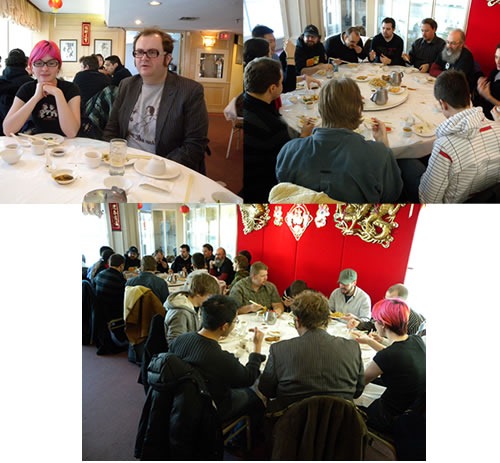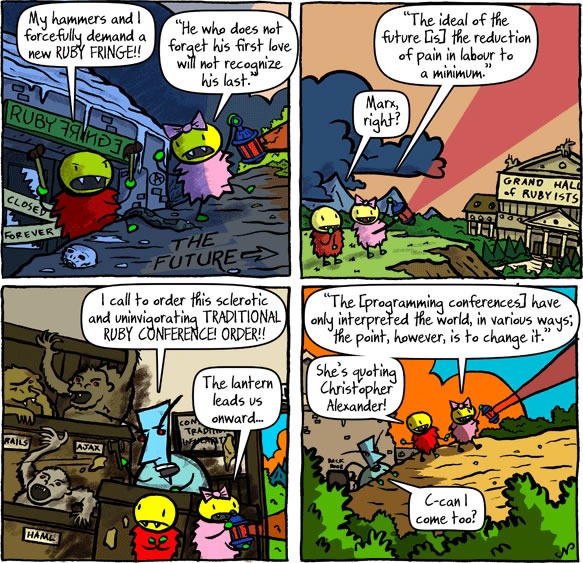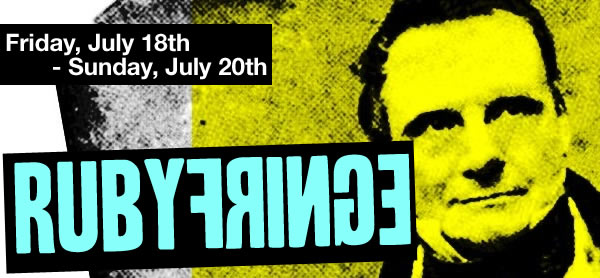This article was originally posted on the Coffee and Code blog.
Here’s a picture of where this week’s Coffee and Code will take place:

On Tuesday, February 24th, from about 1:30 p.m to 5:30 p.m., I’ll be at Le Gourmand, which is located at 152 Spadina (on the west side, south of Queen and north of Richmond). If you’ve ever gone walking around Paris looking for a quick bite to eat, it’ll give you a sense of deja vu. It’s a cafe that doubles as a somewhat pricey mini-grocery that carries gourmet food. They make excellent coffee and hot chocolate (you even get a choice of two of French chocolate mixes), delicious sandwiches, a nice bowl of steel-cut oatmeal with fruit, but most importantly, cookies to die for. Hell, they’re cookies to kill for.
As with all Coffee and Code events, I’ll be working there instead of at my home office or the Microsoft offices so that it’s dead simple for you to walk up to me to talk about anything – Microsoft, our tools, tech and platforms, the industry, whatever!
(Prior to Coffee and Code, I’m going to be at the Developer Lunch at the nearby Sky Dragon restaurant. If you’ve got the time, you might want to check that out too.)

It’s hard to believe, but tomorrow’s Developer Lunch – the get-together of Toronto-area developers organized by Kristan “Krispy” Uccelo – is going to be the 20th in the series. It’s a chance for us to get together over lunch and talk about anything and everything over some tasty dim sum.
Here are the details:
- When: Tuesday, February 24th, from 12:00 noon to 1:30 p.m.
- Where: Sky Dragon Restaurant, located on the 5th floor of Dragon City Mall
(southwest corner of Spadina and Dundas)
Ask for the room with the large gatherings! - Who’s invited: Anyone!
- How much: Every table splits the bill – it seems to average about $11 or 12 per person
After this lunch, I’m going to scurry down the street to this week’s Coffee and Code at Le Gourmand.
FutureRuby: July 9th – 12th, 2009
First Came RubyFringe
I can’t talk about FutureRuby without first talking about RubyFringe.
Last July, the fine folks at Toronto’s Little Coding Shop That Could – Unspace – created one of the best and most memorable conferences I’ve ever attended: RubyFringe. RubyFringe made its mark by taking the standard geek conference formula and turning it on its head. Among the things that distinguished it were:
- RubyFringe was intentionally a small conference, with its attendance capped at 150 attendees.
- No sponsors!
- It had a single conference track, and all presentations took place in the same room.
- The presentations were vetted carefully by people who really, really, really loved the Ruby programming language. This meant that we got interesting speakers and no vendor pitches. We felt Damien Katz’ pain when he talked about his situation prior to creating CouchDB, grooved as Nick Sieger talked about the parallels between jazz and programming, and stayed glued to our seats as Giles Bowkett gave us his rousing call to action in his 400-slide extravaganza, even though he’d gone well beyond his allotted time and was cutting into lunch (it was that good).
- They didn’t allow questions at the end of the presentations. In organizer Pete Forde’s words: “Our experience has been that questions are hard to hear, generally of poor quality, often just statements, and almost always an exercise in demonstrating how brilliant the questioner is while dominating the attention of the whole room.”
- There was a “companion track” for attendees’ non-geeky significant others, where they were taken on a tour of the city while their partners were at the conference.
- They served some of the best food I’ve ever had at a developer conference. The lunches were at the Downtown Metropolitan Hotel, and the big dinner at the Drake Hotel was beyond anything I’ve ever had at a developer conference.
- The conference also included parties at some of the best spots in the city, some of which you wouldn’t find on vanilla tourist guides. Better yet, those parties were open bar!
- Not only was there an opening party at a brewery, complete with stand-up comic, rock band and DJ, but there was a great closing party on Unspace’s roof.
- The organizers paid attention to little details that set the conference apart, from giving everyone transit passes to heralding speakers as they walked on stage with the song of the choice to the giant polaroid montage featuring every attendee.
The organizers’ decisions in crafting RubyFringe made it a high-quality, memorable and inspiring experience, and its carefully limited scale gave it a sense of community that I could almost describe as familial.
Many people who went declared it the best conference they’d ever attended, and many who passed up the opportunity kicked themselves for missing it. Those pale next to the highest praise for the conference: the fact that after attending RubyFringe, a half-dozen handful of attendees were so inspired that they quit their day jobs to strike out on their own doing Ruby development.
Now Comes FutureRuby

With RubyFringe’s resounding success, it was only natural that people would ask if Unspace would be doing it again next year. They gave it some serious thought – the last thing that they wanted to create was a weak sequel. They didn’t want to simply rehash RubyFringe, but reinvent it, just as they had reinvented the developer conference with RubyFringe.
So they reinvented RubyFringe as FutureRuby.
FutureRuby will take place from July 9th through 12th, and will build on what RubyFringe accomplished. The organizers bill it as “an opportunity to prepare for the future by learning from the mistakes of the past”, and promise us that it won’t just be RubyFringe warmed over – we shouldn’t expect to find the same things in the same places!
What else will it have?
- Parties and nightly entertainment, three nights in a row
- FAILCamp (which I co-hosted last year, and which I am invited to host again) is back with a vengeance, and an adorable sailor suit
- “More better than” swag that you’ll be proud to wear in public
- The return of the companion track for partners and secret lovers during the conference
- An amazing two nights of lunches and dinners that you’ll photograph and tweet about
- Loving attention to all of the details, like excellent wifi, transit passes, and no paid presentations
All the details are in this post at Unspace’s blog, Rethink. You can bet that I’ll be at FutureRuby.
The Cafe as Workplace
This article originally appeared in the Coffee and Code blog.
The USA Today article titled Working Out of a “Third Place” may date from October 2006, but it’s still relevant today, and especially in the context of Coffee and Code. Some points from the article:
- About 30 million Americans, roughly one-fifth of the nation’s workforce, spend significant hours each month working outside of a traditional office. Even the U.S. federal government is pushing to give one-quarter of their workforce the option to occasionally work remotely.
- The number of these mobile/flexible workers is growing 10% annually because corporations are increasingly supportive of teleworking for various reasons, from cost savings to redundancy in case of a disaster.
- The rise of the office-less worker has fueled the rise of places like Panera, which has grown to 1,000 locations by catering to them with living room-like surroundings and free wifi.
- Although the people interviewed had home office setups, many found that working in a cafe or other “third place” at least some of the time kept them from feeling isolated.
The article is accompanied by a sidebar piece that lists some of the unwritten rules of etiquette for working at a cafe, which include:
- Pay the rent. Buy a coffee or food reasonably often if you don’t want the owners and staff to think of you as a squatter.
- Watch your stuff. Take your laptop and other valuable gear and documents with you if you’re going away from the table for anything other than a quick run to the sugar-and-napkin station.
- Respect the invisible office walls. Don’t walk into another remote worker’s “office space” unless you’re invited, and no “shoulder surfing”!
- Learn to live with other people’s power cords. “All electrical outlets are fair game, so expect to accommodate the odd power chord as it snakes past your dominion.”
- Don’t be a squatter. “It’s fine to keep your things piled on a table when you step out for a breath of fresh air, but not if you plan to be away a while.”
The article also features bits from interviews with a number of people who either do their work in cafes or study the phenomenon. One of the interviewees, who works at the Pew Internet & American Life Project observes that "It remains to be seen if this is a cultural breakthrough or a generational artifact."
A Shout-Out from Tim O’Reilly
Coffee and Code #1
This article originally appeared on the Coffee and Code blog.
Yesterday, I held the first Coffee and Code day at Toronto’s Urbana Coffee, at the corner of Bay and St. Joseph Streets. The Coffee and Code plan is a simple one: about one day a week, instead of working at the home office or Microsoft’s Toronto or Mississauga offices, I set myself up in a wifi-equipped cafe somewhere in Toronto. As a result, instead of being tucked away, I’m easy to reach, where you can walk up, join me for a coffee and talk about Microsoft, programming, the industry or just about anything else.
Urbana’s Bay/St. Joseph branch used to be a hair salon, which means that its south half, where the stylists used to work, has plenty of power outlets. Although their wifi requires a password, it’s clearly written on the chalkboard behind the counter. As long as you buy something, they don’t seem to mind people hanging out all day – I was there at 11 a.m. and stayed for a full seven hours.
Nobody showed up for the first couple of hours, which was all right – it gave me the opportunity to get some work done, which involved some long-overdue getting up to speed on developing for Azure and Windows Mobile. This involved some downloading, which proved to be a good test of the download speeds of Urbana. I was usually able to get download speeds of about 100 to 120 kb/s, except for when the raver kids a couple of tables over were downloading mash-ups, which slowed things to a molasses-like 20kb/s. As Murphy’s Law would have it, this was right when I was getting those mobile SDKs.

R.T. was the first to drop by.
The first guy to join me was R.T., who’s doing some contract work using Ruby on Rails. He asked what it was like moving back to Microsoft development languages and tools after years of programming using PHP, Python, Ruby and MySQL. I told him that although it sometimes feels like I’m doing things backwards and upside-down, I’m having fun, enjoying getting back into C# coding and playing with interesting stuff like ASP.NET MVC, Silverlight and XNA.
I was then joined by Ahmed, who I hooked up with a copy of the Windows 7 beta (I’d snagged a couple of discs from the TechReady conference). He asked me earlier if I knew about CodeCamp, which will take place in April. Not only did I know about it; I also knew that Microsoft was a sponsor. He also asked if Coffee and Code would involve some kind of coding activity. I’m open to the idea and also open to suggestions. What sort of project would you like to work on?

Andrew dropped by a little later on in the afternoon.
Andrew was the next one to drop by. He does a pretty good business with his indie Rails development consultancy and works from his apartment, which was just around the corner. He was pretty interested to hear about the ASP.NET MVC framework, which takes some of its some of its inspiration from Rails. He mentioned that he might like to try it out in BootCamp on his Mac.

Anton wanted to know about getting into software development.
Anton also dropped by. I know him from the our local rock and roll karaoke night in downtown Toronto. He loves working on his computer and asked how he might get into writing software for a living. I told him that when I decided to leave my first job to become an independent coder, I found customers first and learned the ins and outs of a new-to-me development system – Visual Basic 5.0 Professional Edition – by building software for them. (I pointed out that I did have some programming experience under my belt already, but at the time, I’d only been doing it professionally for two years.)
R.T. suggested that Anton look through GitHub for open source projects and find a couple that he’d like to contribute to. Not only does it give you valuable experience, you can show the code you developed to potential employers (since it’s open source and not under N.D.A.) and it also builds up your base of contacts in the industry. I also suggested that there are a number of worthy Windows open source projects at CodePlex.
I also hooked Anton up with a copy of the Windows 7 beta.
All told, I had four people show up to the first Coffee and Code. There was about an hour-long period when all four were at my table at the same time, which was fun. I answered some questions, they seemed to enjoy themselves and better still, none of the four had met any of the others, which meant that they’d all made new connections through the event. I’m going to declare the first Coffee and Code a success.
I’ve decided to set the date for the next Coffee and Code: next Tuesday, February 24th at Le Gourmand (152 Spadina Avenue, just south of Queen Street and north of Richmond) from 1:30 p.m. to 6:00 p.m. (and I’m thinking of showing up for the morning as well…watch this space). I’m calling it for that day because I’m going to be in the area for a couple of reasons:
- The Developer Lunch at the Sky Dragon dim sum restaurant (top floor of Dragon City mall, at the corner of Spadina and Dundas), which takes place at noon, and
- HacklabTO’s open house evening, which takes place every Tuesday. I’ll be there to check on their progress repairing the Lisp Machine I donated, as well as to show off the demo XBox 360 that just got assigned to me. I’ll probably also show them some quick and dirty XNA development.
So don’t forget – next Coffee and Code at Le Gourmand on Tuesday!



![Screen capture of Tim O'Reilly's tweet: "Joey da [sic] Villa's Coffee and Code http://bit.ly/L65XC More well known geeks ought to do this. I think I'll try it myself one of these days." Screen capture of Tim O'Reilly's tweet: "Joey da [sic] Villa's Coffee and Code http://bit.ly/L65XC More well known geeks ought to do this. I think I'll try it myself one of these days."](https://www.globalnerdy.com/wordpress/wp-content/uploads/2009/02/tim-oreilly-coffee-and-code-tweet.gif)